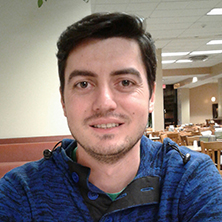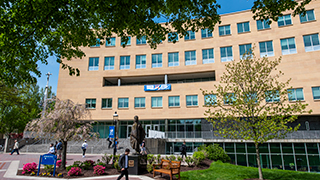Chemistry Final Ph.D. Seminar on Photocatalysis - Seton Hall University
Sunday, March 31, 2019

The seminar will be held on Tuesday April 2, 2019, from 5:45 – 7:00 p.m., in the Helen Lerner Amphitheater, Science and Technology Center. Refreshments are available at 5:30 p.m.
Marius Pelmus finished undergraduate studies in chemical engineering and earned a Master in Pharmaceutical chemistry from 'Politehnica' University of Bucharest, Romania. After working for 3 years as an industrial R&D chemist, he joined the Center for Organic Chemistry of the Romanian Academy in 2013 and, in 2015 started his Ph.D. work at Seton Hall University.
Metallo-phthalocyanines (Pc), metallo-porphyrins analogues, accidentally discovered at the dawn of the 20th Century exhibit outstanding thermal and chemical stability, intense colors and reversible redox properties. They have found applications as pigments, catalysts and photocatalysts, fuel cells, cosmetics, etc. Our previous 1st generation, highly electron deficient Pcs, F64PcM(II) series, which exhibit a Teflon-like shield around their M(II) centers and sterically hinder photocatalysis-deactivating π-π interactions, have now been extended to 2nd generation, metal-functionalized F64PcM(III)X (M = Ga, In; X = Cl) series.
Surprisingly, the replacement of a single fluorine atom in the parent F52PcZn by an amino group quenches the photocatalysis and fluorescence, effects hypothesized to be due to the conjugation of the amino lone-pair with the Pc frontier orbitals. The exocyclic conjugation of the N lone pair via the formation of an amide fully restores the reactivity in solution, while simultaneously allowing the covalent anchoring of the Pc on a functionalized support and the restoration of the fluorescence and reactivity of the hybrid materials.
The 6 new precursors and 11 new phthalocyanines obtained over the past 3.5 years, including 13 compounds that yielded X-Ray quality crystals, provided a basis for establishing: (i) structural-activity and mechanistic relationships for both PNs and Pc catalysts, (ii) DFT calculations as well as for (iii) the rational design of 5 heterogeneous hybrid catalysts.
The Department of Chemistry and Biochemistry offers B.S., M.S., and Ph.D., degrees with specializations in all areas of chemistry. Our unique research environment, including traditional full-time students and part-time students is designed to foster collaborations with industry and colleagues in other disciplines. The Rose Mercadante Seminar Series is named for Rose Mercadante, the departmental secretary for over 40 years, in honor of our alumni, her "boys and girls".






